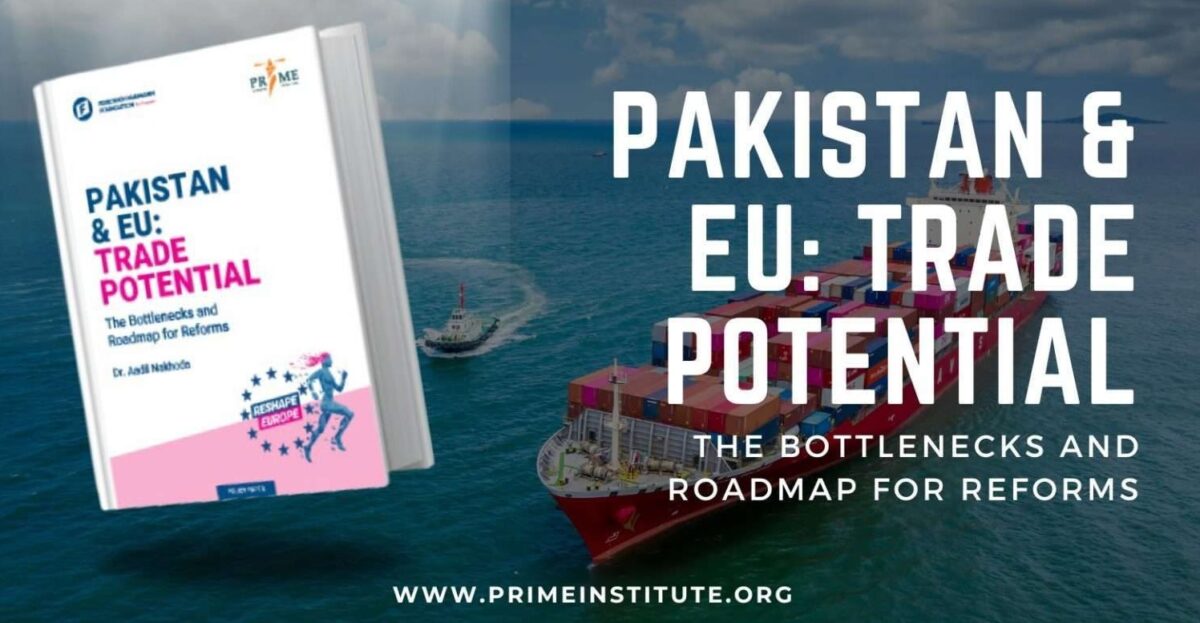- Advertisement -
ISLAMABAD, Oct 3 (APP):A prominent economist, Dr. Aadil Nakhoda Tuesday stressed the vital importance of preserving Pakistan’s GSP Plus status, warning that its loss could result in a substantial loss exceeding $ 3 billion and worsen the nation’s balance of payments.
Speaking at the 7th Islamabad Policy Exchange event, Dr Adil, the author of “Pakistan and EU Trade Potential: The Bottlenecks and Roadmap for Reforms,” urged Pakistan to diversify its products and improve quality to access untapped European markets.
Nakhoda’s report, co-published by Policy Research Institute of Market Economy (PRIME) and the Friedrich Naumann Foundation, analyzes Pakistan’s trade with the EU, highlighting the risks of Generalised Scheme of Preferences (GSP) Plus withdrawal and the need for regulatory improvements.
It emphasizes the need for Pakistan to prioritize consumer satisfaction, eliminate regulatory obstacles, provide exporters with knowledge of global standards, diversify its exports, and promote Small and Medium Enterprises (SMEs) for economic growth.
Emphasizing the need for Pakistan to broaden its product variety and enhance quality through strategic diversification to access untapped European markets, he stressed the importance of Pakistan strategically diversifying by expanding its product range and improving quality to tap into untapped EU markets.
The report, examines key facets of Pakistan’s trade with the European Union, highlights the implications of a possible withdrawal of the GSP Plus status and provides essential guidance for policymakers and businesses.
While analyzing unit value and Revealed Comparative Advantage (RCA) data, the author highlighted the success stories of Vietnam and India in exporting high-value, quality products, stating that Pakistan must prioritize consumer satisfaction in export markets.
The report emphasized the significance of enhancing the regulatory landscape and fostering a business-friendly environment.
Dr. Nakhoda’s research findings highlighted that the regulatory framework is intricate and leads to distortions, thereby increasing the expenses associated with conducting business.
He emphasized that to boost exports, it is imperative to eliminate regulatory obstacles and lower the operational expenses for companies.
Additionally, he pointed out that Pakistani exporters require instruction and knowledge regarding evolving global standards and compliance prerequisites. This would enable domestic producers to enhance their methods and meet quality standards.
The report notes that a narrow export basket and limited market diversification are among the causes of Pakistan’s low export earnings. It recommends that Pakistan must not only diversify its exportable goods but also graduate to higher value-added products. Exporters need to explore unconventional markets to increase their earnings.
In this regard, Dr. Nakhoda pointed towards the expansion of two critical initiatives: the Pakistan Single Window and the National Compliance Center, to facilitate exports and enhance integration into global value chains.
The report also notes that female labor force participation remains low and calls for concerted efforts to empower women and harness their potential.
The report highlighted the importance of SMEs and their potential in promoting industrialization and exports of the country. Currently, policies are inclined towards promoting large scale industries while negligent attention is paid to facilitate SMEs. To embark on a growth trajectory and escape vicious cycle of balance of payment crises, it is crucial to promote SMEs by reducing regulatory hurdles.

